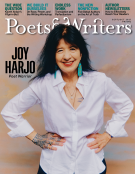In the past few years Aurielle Marie (they/she) says the manuscript that became their debut poetry collection, Gumbo Ya Ya (University of Pittsburgh Press, September 2021), grew more “wildly audacious.” After walking away from a book deal that didn’t serve her, she “stopped editing out all these queer or strange or subversive poetic moves.” The final collection, which went on to win the Cave Canem Poetry Prize, is a swirl of texts and voices, with visually inventive typography and poems, some featuring words cascading down the page, layered on top of one another, or pushing beyond the margins. The book subverts and refuses form—“there ain’t / no word to call this what it is,” writes Marie—showing that there is no single shape to the stories of Black queer femmes, no single mode of loving and supporting Black and Brown communities.

Aurielle Marie.
Upon encountering the poetry journal BOAAT, Marie was “enthralled by how so many poems incorporated play, how even its most serious of poems had lightness running through.” At the time, Marie—a writer and former organizer—was traveling between Ferguson, Missouri, and New York City, “writing a lot of really heavy, really hard poems about police violence—necessary poems.” She challenged herself, though, to write a poem for the online publication. “BOAAT was the prompt,” they say, “and it actually worked.” The editors published her poem titled “Like a Freedom Too Strange to Be Conquered,” which, as Marie says, “explores queerness in the South and the fear and desperation you feel” and incorporates elements of serious play (“i / swear, I wanna / play dead on the black top”). A recent issue of BOAAT, helmed by poetry editor Aria Aber, featured Carlina Duan, Hazem Fahmy, and Keetje Kuipers, among others. Journal submissions are currently closed.
Marie struggled to place two poems—one about police brutality and oral sex, another that criticizes Walt Whitman—until finding a home for them with TriQuarterly, where the editors supported the work with integrity and care, “working around the clock to make sure my funky line things looked good,” Marie says. “Their appreciation of the poem and the poet were the same. It never felt transactional; it always felt like collaborating on putting a poem out into the world.” Edited primarily by current and former students of Northwestern University’s creative writing graduate programs, the biannual recently released its Summer/Fall 2021 issue, which focuses on Black voices and includes pieces by Marie, Kemi Alabi, Cornelius Eady, Porsha Olayiwola, and Phillip B. Williams. The journal will accept submissions in poetry, fiction, and nonfiction in October. Submissions of videos, interviews, and craft essays are open year-round. “It is always so cool to see, say, Kayleb Rae Candrilli write alongside poets like Tracy K. Smith and Jericho Brown,” says Marie of TriQuarterly. “It always feels like a place where you open up an issue and anything’s possible.”
Poet Julian Randall, a previous winner of the Cave Canem Poetry Prize, encouraged Marie to add the Southeast Review to her submission rotation. She followed that advice and in 2019 placed as a finalist in one of the journal’s four annual contests, the Gearhart Poetry Contest; Marie was delighted that judge Nabila Lovelace selected for publication her poem “& not by sight,” which Marie calls “a little squid of a poem—weirdly shaped, gangly, and squirmy with too many visual images and so many strange words put together.” Housed at Florida State University’s English department, Southeast Review features poetry, prose, and art. The biannual appears in print and online, and the editors also regularly publish interviews, craft talks, and reviews on the site. Submissions are open year-round.
“As someone submitting work, it’s kind of your job—especially if you don’t have unlimited financial resources—to see who’s reading and who they publish,” Marie says. “Can they hold the nuances of the work? Do I think they might understand what I’m trying to do, do I think they’ll value it beyond understanding it?” This series of questions led Marie to enter the 2019 Emerging Writer’s Contest run by print quarterly Ploughshares. They submitted because they connected with the sensibilities and work of judge Fatimah Asghar, who later selected Marie as the poetry winner. Published since 1971 and housed at Emerson College in Boston, Ploughshares released a blockbuster Summer 2021 issue celebrating its fiftieth anniversary. Guest edited by Aimee Bender, the issue brings together fiction by Rumaan Alam and Nana Kwame Adjei-Brenyah with nonfiction by Marilyn Abildskov and Nafis Shafizadeh, among other pieces. The magazine publishes both poetry and prose, and submissions in all genres are open.
Marie advises other writers looking to publish work to not take “every rejection as a personal value metric” and says that “consistency and audacity work together to make magic happen.” They also pass along advice from Danez Smith: “The best writers are the best readers.” As for journals, Marie notes the excitement and honor of being published and also says, “I have a desire for every literary journal to govern themselves with intentionality and integrity around marginalized voices particularly.” They add, “Every journal could do better. There is no perfect praxis.”
Dana Isokawa is the senior editor of Poets & Writers Magazine.









